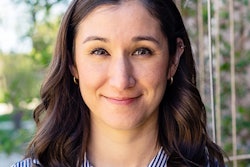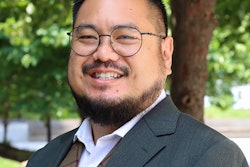Title: CRT Forward Project Director, UCLA School of Law, and Lecturer of Law, University of Southern California
Tenured: No
Age: 34
Education: B.S., legal studies, St. John’s University; LL.M., UCLA School of Law; and J.D., Georgetown University Law Center
Career mentors: Eloise Pasachoff, Georgetown University Law Center; Janel George, Georgetown University Law Center; Noah Zatz, UCLA School of Law; Dr. Laura Gomez, UCLA School of Law; and Ching Wen Rosa Yen, St. John’s University
Words of wisdom/advice for new faculty members: “You belong here.”
Taifha Natalee Alexander lives her life by the guiding thought: would this make my mother, my husband, my sisters proud?
“At my core, that’s what drives and motivates me,” says Alexander.
Alexander’s mother immigrated from Jamaica to Queens, New York, with hopes to give her children access to opportunities she never had. So, her recent and unexpected passing had a tremendous impact on Alexander.
“Even if the person you’re doing something for isn’t around, it’s still important to try and live your life in a way that would make them proud,” says Alexander. “Without [my mother’s] sacrifices, my sisters and I wouldn’t have been able to achieve the things we’ve been able to accomplish.”
Alexander’s upbringing in Queens was far from easy. She calls the experience “formidable,” as she witnessed “massive injustices as it related to police encounters,” particularly for Black and Brown youth in the borough.
“Things like that really shaped my understanding of the systems under which we are all operating,” says Alexander. “But it wasn’t until I went to St. John’s University in Queens for undergrad that my understanding of multiculturalism, the ideals of a multiracial democracy, began to forge my passions and interests and put me on the path to law school.”
Alexander is a lecturer of law at the University of Southern California (USC) Gould School of Law. She is the project director of Critical Race Theory (CRT) Forward, a database that, she says, identifies, tracks, and analyzes governmental actions or legislation “that aim to restrict access to truthful information about race.”
CRT Forward’s data have been used by parents, educators, and activists across the nation and globe as censorship laws spread.
“Folks can go on our website and see if a measure is pending at their local board. They can go in and submit comments over email or engage in an intentional way to say, ‘We want our students to have access to truthful information about race and racism,’” says Alexander.
Anti-CRT “architects,” adds Alexander, are hard at work manipulating the protective nature of parents. They are “well aware of the power of the ‘momma bear,’” says Alexander.
“There’s a lot of work that has to be done to disentangle the intentional misinformation and disinformation to help the momma bears realize that it’s not CRT or diversity, equity, and inclusion that are harming their children; it’s the ones feeding the misinformation that do that,” says Alexander. “I think that’s where we need to start, building these bridges, helping folks understand the full scope and magnitude of these attacks and the architects of them.”
Noah Zatz, a professor of law and labor studies at UCLA, first met Alexander when she was a student in his Low-Wage Workers course. He says Alexander’s work as a scholar and institution builder is helping to integrate racial justice into the foundation of organizations. Alexander, he adds, is unveiling how racial justice is either “facilitated or constrained by the broader legal environment.”
“Understanding these initiatives is crucial to the ongoing struggle for a multi-racial democracy, as they have become a prime vehicle for backlash against the racial reckoning of 2020,” says Zatz. “Efforts to dismantle white supremacy are often recast legally as unfair to those who feel entitled to dominance.”
Alexander says she wants to “ensure the magnitude and scope of anti-CRT campaigns does not continue to spread and frustrate students’ ability to gain access to the tools they need to address the most pressing social justice and racial issues of our time.”
“These students have so many ideas and thoughts, interests, desires, and aspirations for what the world should be, and I consider it a professional honor to help manifest them in the spaces we occupy together,” she continues. “I really do take that into my role, allowing students to envision radical changes and use the law as a tool to create the world they want to live in. That’s been the honor of a lifetime.”





















